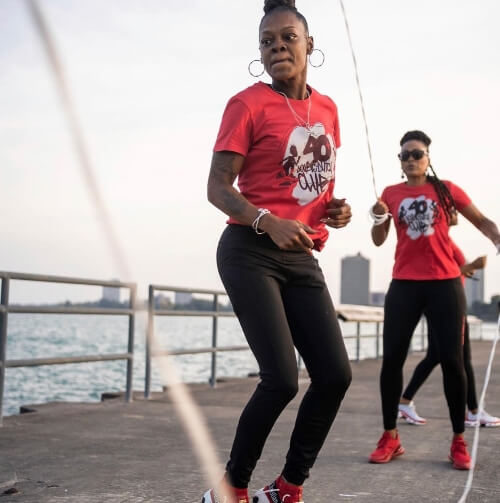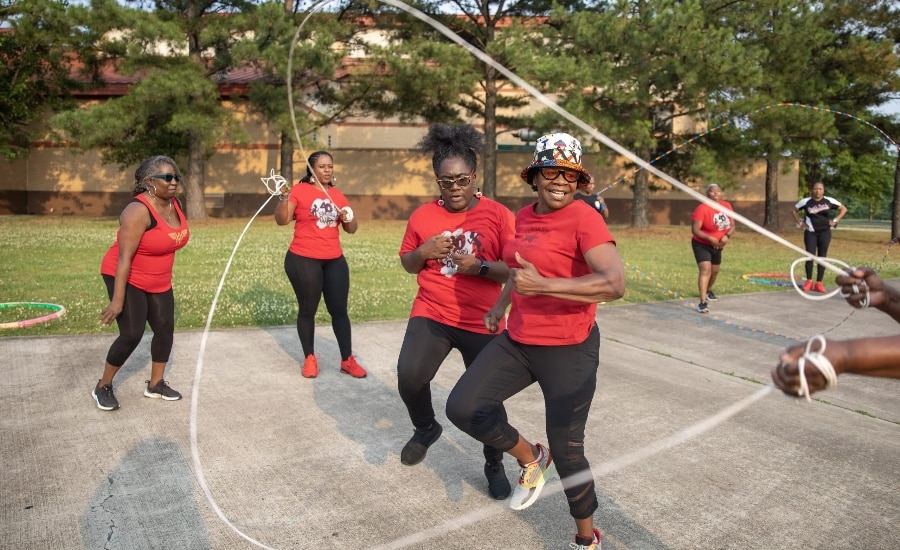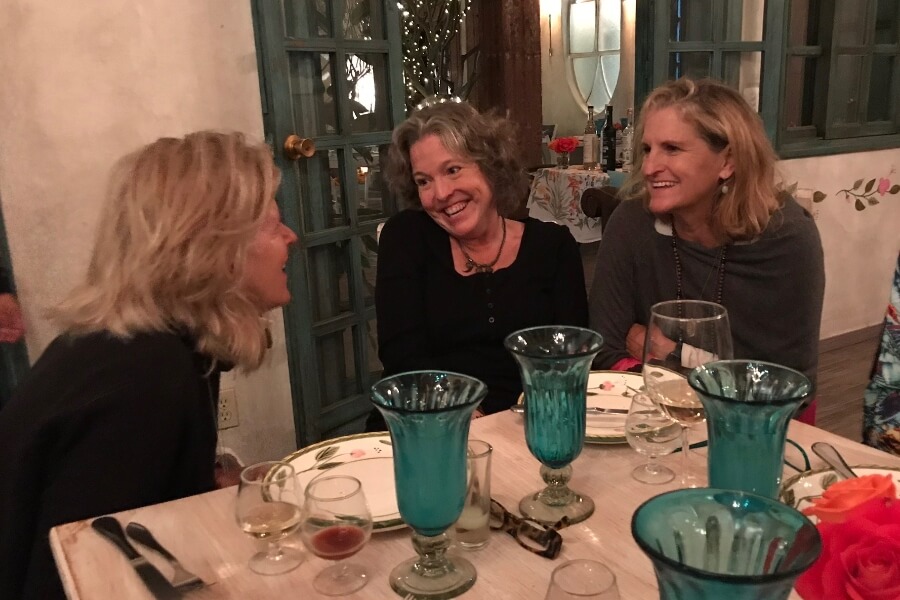We can still remember how many times we stumbled trying to jump one rope as our friends at recess turned it around and around. We didn’t even dare try the highly sophisticated timing and footwork necessary for Double Dutch, a game that has two people turning two ropes in rhythm and somehow the jumper makes it into the egg-beater-like churn and even does some dance-like moves.
But recently we started dreaming about giving Double Dutch a go when we learned about a national group–with chapters in numerous cities–devoted to the fine art and fine fun of jump rope games. Double Dutch 40+ is devoted to inspiring women to engage in friendship, fitness, fun, and fellowship, according to the group’s website. “We envision communities where women can live out their purpose as they walk in mental and physical health, encouraging and empowering themselves and other women over 40 while inspiring generations to come.”
Read More: It’s Not Too Late to Become a Pro Sports Dancer
The Joy of Jumping

The joy of jumping–heck, the joy of just watching women jumping (check out the videos here)–is so infectious that the organization has grown rapidly. But the secret sauce is that it’s about much more than playing a game.
A lot of women over 40 spend so much time taking care of everybody else.
Founded in Chicago in 2016, Double Dutch 40+ now has more than 100 chapters in 30 states and three countries beyond the U.S. borders. The game, which was played mostly by girls and involves two (or sometimes more) people turning the ropes for one or more jumpers, was a mainstay of 20th-century urban African American communities but then faded from city streets before this recent resurrection.
Meet ups are happening every day around the country. A Double Dutch 40+ meet up usually lasts about 90 minutes. All members must wear Double Dutch 40+ T-shirts (the better for photos and social media). After 10 or so minutes of stretching, the play begins, usually with great music booming for inspiration and added fun. Besides jumping Double Dutch, members spin hula hoops or skip along a hopscotch course. The meet up ends with a prayer circle.
At a recent event–called the Beale Street Takeover in Memphis–all the members wore their ages on the back of their shirts, which is a glorious testament to aging boldly. While the white ropes spun over and under in videos, we saw the numbers “48,” 58,” “66,” “71” flash by, which made us think, “We could do this! We should do this!”
Getting Back to the Ropes

Founder Pamela Robinson.
The woman who got the jump ropes spinning again is Pamela Robinson, who says that when she was a child, double Dutch was her “happy place.” In 2016, she found herself in a spot where she needed to return to that happy place.
Jumping Double Dutch gave Founder Pamela Robinson something to smile about.
“I was 45,” Robinson told the Washington Post. “I was going through a very difficult place in my life. … My 20-year marriage was ending. I’d been a stay-at-home mom for almost 20 years. My kids didn’t need me at home in the same way. I felt like I was sinking into depression.”
So Robinson approached a friend. “We need to start doing double Dutch like we did in the ’70s,” Robinson told her. “It would give me something to smile about.”
Their first meeting was seven neighbors and church friends in a high school parking lot. “We jumped and we played and we laughed and we jumped,” Robinson said. They created a Facebook page, which grew to about 30 women. In 2019 a Chicago TV station aired a segment on them. In two days, the group exploded to more than 1,000 women around the world.
All-Around Healthy

Many women have, like Robinson, found relief from the pressures of life on the playground. “A lot of women over 40 spend so much time taking care of everybody else,” Robinson has said. “We are worried about our careers. We are just always focusing on other things other than ourselves.”
The group even has a philanthropic arm called “No Sister Left Behind,” which assists members who are going through a hard time. Funds are raised through ticketed events and the sale of T-shirts and the like.
The added bonus is that the members are becoming more physically fit.
The added bonus is that the members are becoming more physically fit. Several members recently told the New York Times that their health had changed for the better. They have lost weight, gotten more mobile, increased their cardio and have noticed that they feel better overall.
These health boosts are not surprising. Jumping rope, which is a full-body workout, is an effective form of cardio. Research suggests that a 10-minute jumping session is equivalent to a 30-minute run. Plus, it improves overall strength, agility, balance, and coordination.
In the recent Washington Post article, Cheri Ramsey, 60, a kindergarten teacher from Upper Marlboro, Md., reported that she recently went for her annual physical. “My doctor said: ‘Guess what? I don’t think you’re going to be taking any more blood pressure medication. What have you been doing this past year?’” Ramsey recounted. She told him she’d been jumping double Dutch. “Well, you keep it up,” her doctor said.
She can now take walks with her grandson that once would have been too strenuous. “Before, I was close to prediabetic,” Ramsey said. “I’m not even concerned anymore. Sometimes, you get something and you didn’t even know you needed it.”
Read More: “I Never Thought I’d Be This Fit:” A Late-Blooming Athlete’s Story
Top photo by Ariel Cobbert for MLK50. All other photos courtesy of Double Dutch 40+ social media.





















0 Comments